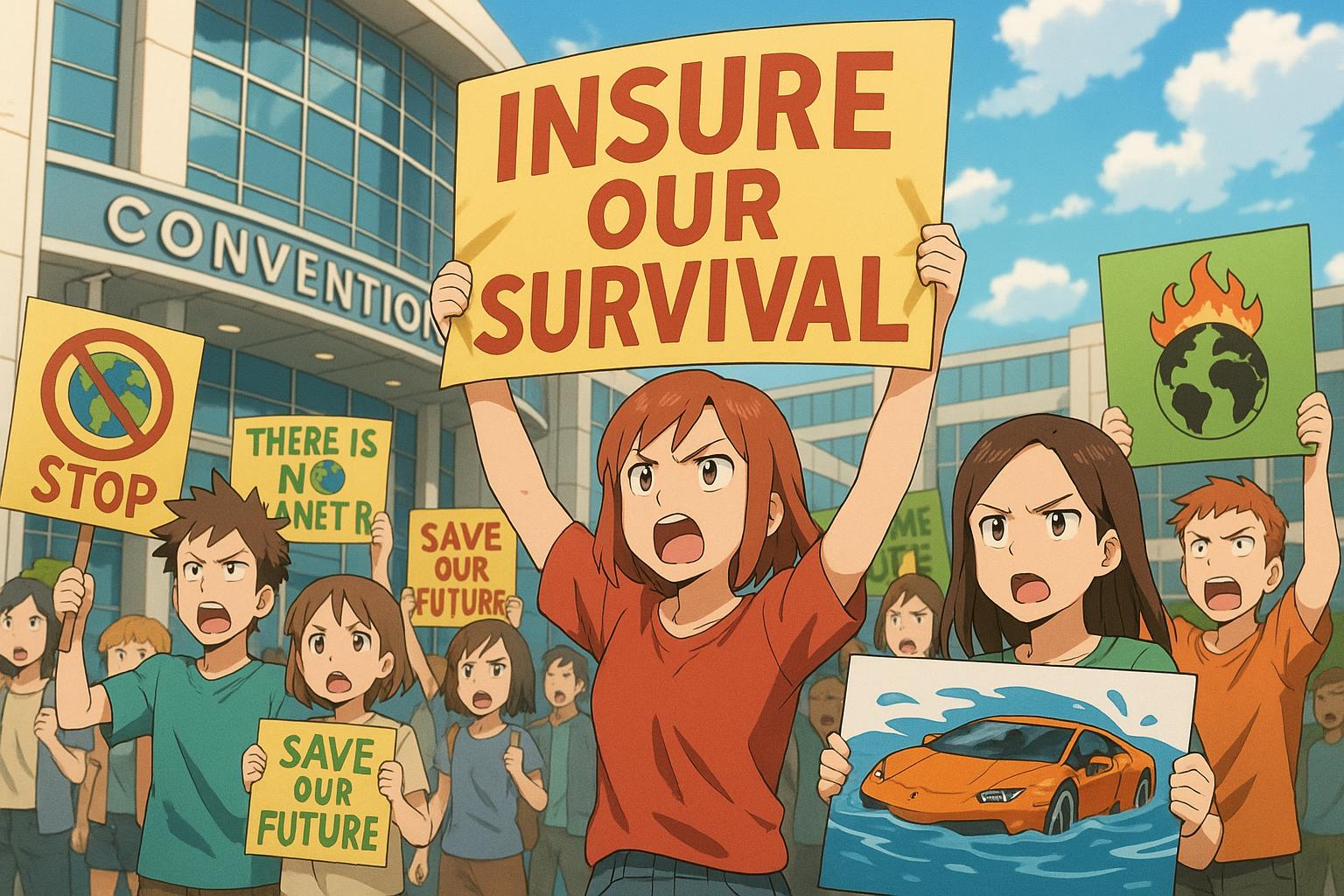Climate activism has reached a fever pitch, with Extinction Rebellion’s Insure Our Survival campaign once again targeting the British Insurance Brokers’ Association (BIBA) at their annual conference. For the third consecutive year, campaigners gathered outside the Manchester Central Convention Centre, making it clear that insurance companies must take responsibility for their pivotal role in perpetuating the climate crisis. The dramatic protest, described by participants as both colourful and impactful, aimed to pressure delegates to boycott fossil fuel projects that rely on insurance coverage to go ahead.
Sarah Brown, representing XR Macclesfield, articulated the central argument of the campaign. “Any big fossil fuel projects, pipeline, coal mine, whatever it is, they all need insurance companies to back them,” she said. “So if you get the insurance companies to say they won’t back them, you can’t have any more fossil fuel projects.” This emphasis on the insurance sector’s complicity in the climate crisis underscores a wider push for accountability, as activists increasingly target companies that fuel environmental degradation.
In collaboration with organisations such as Friends of the Earth and Manchester Greenpeace, the day-long event featured a series of performance art and immersive activities, including a life-sized Lamborghini model designed to look as if it were submerged in floodwaters, symbolising the urgent threat of extreme weather caused by climate change. The protest also included engaging elements like a climate choir, samba drummers, and testimonies from individuals affected by climate disasters, enriching the message with personal stories and artistic expression.
Notably, the protest attracted significant media attention, with local and industry outlets covering the day’s events extensively. Activists reported engaging with over 100 conference delegates, aiming to inspire them to advocate for greener practices within their companies. While reactions varied—from enthusiastic support to indifference—Brown noted the importance of fostering dialogue. “It’s good to be having the conversation,” she said. “They may never be on the streets with us, but if they can have influence from the inside, that’s what we’re aiming for.”
The focus on the insurance industry is not an isolated phenomenon but is part of a broader movement impacting corporate practices. Recently, several leading global insurers, including Chubb, announced their decision to withdraw coverage for the controversial East African Crude Oil Pipeline (EACOP), a significant victory for climate activists who have campaigned vigorously against such projects. This aligns with a wider shift in the insurance industry as firms recognise the considerable risks associated with underwriting fossil fuel projects. Martin Porter, a spokesperson for the coalition behind the protest, highlighted this shift: “The insurance industry, whilst it makes a profit from these projects, makes a loss on the consequences of climate change.”
Despite the progress made, challenges remain. Some insurers, such as AIG and Tokio Marine, have continued to back projects like EACOP, prompting ongoing calls from activist groups for them to reconsider their roles. Human Rights Watch has also emphasised the human and environmental damage associated with EACOP, urging insurers to abandon support for projects that contradict global efforts to limit temperatures and prevent the catastrophic effects of climate change.
As the discourse around fossil fuels and climate accountability evolves, it is clear that the intersection of activism, corporate responsibility, and environmental sustainability remains a pivotal battleground. With initiatives like the Insure Our Survival campaign, activists are not only seeking to disrupt conferences but also to catalyse a meaningful shift in how the insurance industry engages with environmental issues.
Significant future actions are already on the horizon, promising to keep the pressure on insurance companies and keep the conversation about climate responsibility at the forefront of public discourse. The path to change may be fraught with challenges, but as demonstrated by the recent protests, the commitment to saving the planet remains steadfast.
Reference Map:
- Paragraph 1 – [1], [2]
- Paragraph 2 – [1], [3]
- Paragraph 3 – [1], [2], [4]
- Paragraph 4 – [1], [5]
- Paragraph 5 – [6], [7]
Source: Noah Wire Services
